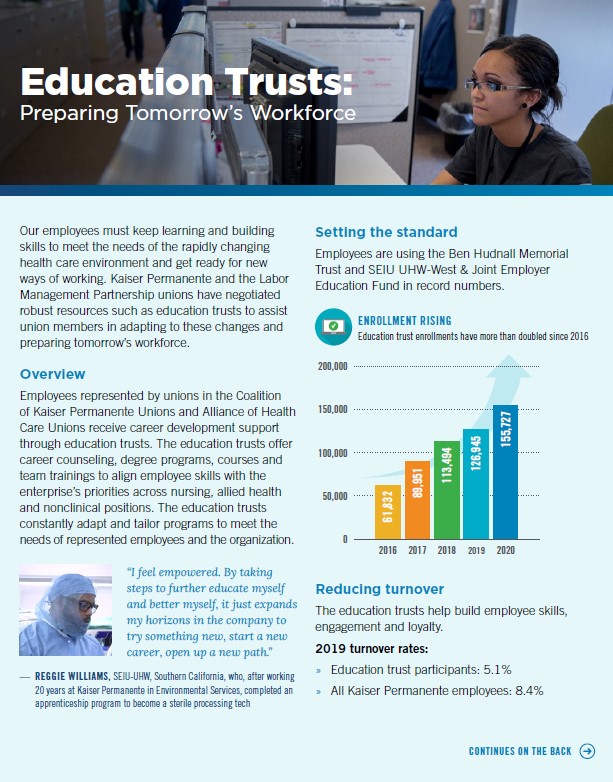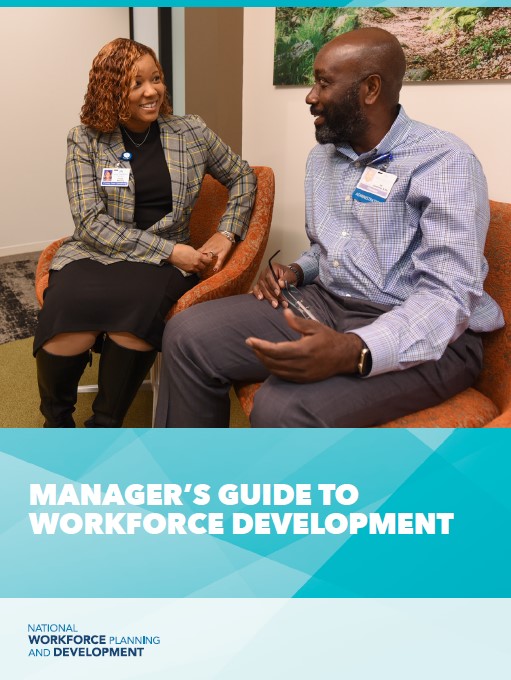TOOLS
Deck
Get tips on the future of workforce learning; view webcast recording for internal use
Even during the COVID-19 pandemic, it's important to make time to learn.
Priscilla Gill and Dawn Nelson of Mayo Clinic emphasized the importance of learning while working during Kaiser Permanente's Future Ready webcast February 25.
"The future of work is about learning," said Gill, director of Workforce Learning. "We all should strive for continuous learning and to be lifelong learners."
"Everyone is some form of a leader," said Nelson, nurse administrator for Education and Professional Development. "Think about how you can grow your personal leadership skills."
Because of the increasing importance of lifelong learning, Labor Management Partnership unions and Kaiser Permanente have negotiated industry-leading resources to assist union members in adapting to change, including tuition reimbursement and education trusts — which had record usage in 2020. Future Ready, hosted by National Workforce Planning and Development, is part of the Workforce of the Future initiative to prepare employees for tomorrow's jobs.
"This is something we've been doing for years and has become even more important with the global pandemic," said Monica Morris, senior director for National Workforce Planning and Development.
3 types of learning
Gill and Nelson agreed, noting the shift this past year to virtual education.
"COVID truly accelerated a lot of our plans," Gill told moderator Peggi Winter, Kaiser Permanente's nurse educaiton leader. "It has indeed moved us at least 5 years into the future."
The webcast, which detailed examples specific to nursing, highlighted learnings that can be applied to many job classifications across Kaiser Permanente.
Mayo Clinic, an integrated health system, emphasizes learning from day one through each career step. This includes learning:
- Experientially on the job
- Socially through learning communities, mentoring and coaching
- Formally with programs, courses, workshops and conferences
"As leaders, we should get to know our staff and understand what their dreams and aspirations are," Gill said. "In doing so, we can help them craft a career plan."
For nurses, learning starts with onboarding, then continues with professional development, a nurse leadership program and nurse leader growth opportunities.
"It is important for staff to be encouraged and guided to find their areas of interest in leadership," Nelson said.
To learn more, view a webcast recording for internal Kaiser Permanente use only.
Videos
()
Watch this short video to hear what LMP team members in KP Washington have to say about the benefits of Partnership for frontline workers, managers, and physicians.
Videos
()
Kaiser Permanente encourages lifelong learning and job growth for all employees. Learn more about what workforce development can offer you. Visit kpcareerplanning.org.
Deck
Explore Workforce Development Week resources
Kaiser Permanente offers many resources to help you advance your career.
Looking to get started? View sessions from Workforce Development Week and follow these 5 recommendations from the October virtual event.
1. Keep learning.
Kaiser Permanente encourages lifelong learning. Resources range from mentoring to tuition reimbursement for everyone to education trusts for eligible union members.
Sadao Nakachi, an emergency room registered nurse and UNAC/UHCP member in the Southern California Region, advanced professionally by using tuition reimbursement and the Ben Hudnall Memorial Trust to earn bachelor’s and master’s degrees.
Ingris Solares, an SEIU Local 105 member in the Colorado Region, began as a phlebotomist before completing a yearlong apprenticeship program with the SEIU UHW-West & Joint Employer Education Fund to become a medical lab technician.
View their success stories in the Day 1 and Day 2 employee panels.
2. Have a growth mindset.
Feel stuck in your current job? Reframe your thinking, says Michael Brown, vice president of Human Resources in the Georgia Region.
“You’re really not stuck. What you’re doing is developing expertise on that job. It provides you an opportunity to deliver strong results. That is good currency that you can take with you to that next position,” Brown said in a career expert panel.
View a recording of the leader panel.
3. Talk with your manager.
Managers should encourage employees’ career growth, says Kerrin Watkins, Dental Office manager in KP’s Northwest Region. She discusses workforce development with team members to understand their needs, inform them about resources and support their use of education trusts.
“Invest in your employees,” Watkins says. “If you take care of your employees, your employees will take care of your business.”
View Day 3 videos from Watkins and Georgia Region managers Philidah Seda and Sophia Wilson and learn more in the Manager’s Guide to Workforce Development.
4. Follow your professional dreams.
It’s never too late to develop your career, says Dennis Dabney, senior vice president, National Labor Relations and Office of Labor Management Partnership.
When Dabney was 40 and working in Human Resources for an automotive parts supplier, he decided to go to law school. He studied nights and weekends to get his degree. His extra work paid off, opening doors to career growth. Learn more in Dabney’s Day 1 video.
5. Just do it.
Kaiser Permanente employees can receive tuition reimbursement of up to $3,000 each year for successfully completing eligible courses.
Hiren Patel, a senior systems administrator in the Northern California Region, started as a pharmacy tech. He moved up in the organization using tuition reimbursement to get a bachelor’s degree and is currently pursuing a master’s degree.
“Make a plan and be flexible,” Patel says. “Just do it.”
Listen to Patel’s story on the Day 2 launch of the Excel Yourself podcast and explore the event’s website for additional episodes, Ask an Expert sessions, videos and more.
National Workforce Planning and Development hosted Workforce Development Week in collaboration with the Alliance of Health Care Unions and Coalition of Kaiser Permanente Unions.
Videos
()
When a state-of-the-art lab opened, some feared the new technology. Employees worried it would replace jobs. But the results may surprise you. See how adapting to change is helping patients, workers and Kaiser Permanente.
TOOLS
Hank Q2Q3-2020
See the whole issueA Quest for Learning
Deck
Building skills helps employees adjust to changes
Even during a pandemic, it’s important to keep learning.
When Kaiser Permanente storekeeper Vincent Woodard heard about skills days in May at Oakland Medical Center, he signed up.
“You’ve got to keep up with the times,” says Woodard, an SEIU-UHW member who orders and delivers supplies for doctors and nurses. “I’m always wanting to learn more. The more I know, the more I can teach and share.”
Kaiser Permanente encourages lifelong learning. With COVID-19 reshaping health care from the emergence of new roles to increased virtual care, the 2 Labor Management Partnership-supported education trusts are tailoring trainings to help employees adapt by building career resilience and digital skills.
Partnership Supports Upskilling
Northern California’s Workforce Planning and Development Committee was planning skills days when COVID-19 hit. The committee wanted to proceed. The administration agreed. In 2 weeks, labor and management organized skills days with the SEIU UHW-West & Joint Employer Education Fund.
“It’s a trying time with workflows changing to adapt to COVID-19,” says committee labor co-chair Sonya Allen-Smith, an SEIU-UHW contract specialist. “You have to stay skilled up because the work world is constantly changing.”
More than 80 employees participated in 2 Oakland sessions. Housekeepers, medical assistants and radiology techs met in a large conference room, wearing masks and keeping social distance, learning in person and virtually about communication, leadership and emotional intelligence.
Woodard, a 7-year Kaiser Permanente employee and longtime youth basketball coach, related to lessons about teamwork, bringing positive energy and managing frustrations.
“I’m definitely going to use this,” Woodard says. “You’re not always going to get your way. You’ve got to know when to walk away. Hold yourself accountable.”
Northern California is looking to expand skills days. Other regions also are exploring virtual skills days.
“This training is good for labor and management,” says Janis Cruz, support services administrator for the East Bay. “It helps develop soft skills to navigate uncertainty and ignite interest in continued learning.”
Building career resilience
To help adjust to changes, Kaiser Permanente and the education trusts offer online critical skills courses in collaboration, consumer focus, digital fluency and performance improvement.
In May, the Ben Hudnall Memorial Trust launched the Career Resilience Quest, an online course that explores the characteristics of resilience — the ability to adjust to workplace change as it happens.
“We’re experiencing drastic change,” says Ben Hudnall career counseling project manager David Rosenberg. “Developing resilience in general, and career resilience specifically, really helps to respond constructively.
“Career resilience characteristics are like muscles. We need to exercise those muscles, so they’re strong.”
Pharmacy assistant Sergio Romero, a UFCW Local 324 member in Southern California, knows the power of resilience. A few years ago, his mother and roommate died months apart.
He reflected on his career, worked with Ben Hudnall career counselor Jan Cummings, completed a certification program and then began the resilience course.
“With this pandemic, there’s a lot of hopelessness,” Romero says. “The resilience quest boosted me back up. It kept me going.”
Videos
()
After 20 years as an environmental services worker, Reggie Williams was ready for a change. He found an apprenticeship program that catapulted him into a new career.
Do you want a change? Visit kpcareerplanning.org, the SEIU UHW-West & Joint Employer Education Fund and the Ben Hudnall Memorial Trust websites to see what's available for you.



